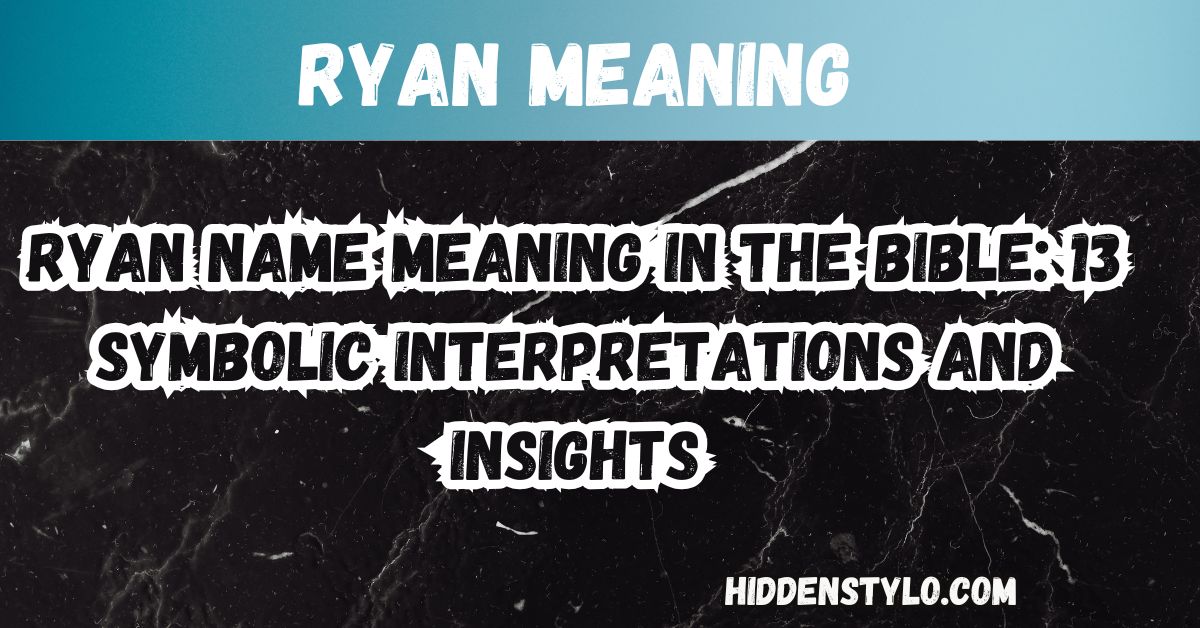Ryan Name Meaning in Bible, Names carry weight, history, and profound meaning, especially in biblical contexts. One such name that sparks curiosity is “Ryan.” Though it’s often seen as a modern name, its deeper origins and potential biblical significance can offer a rich understanding.
In this article, we will dive into the Ryan name meaning in the Bible, its symbolic interpretations, and how it might connect to biblical themes of kingship, strength, and spiritual leadership.
Ryan Meaning
The name Ryan is of Irish origin, and it has often been interpreted to mean “little king” or “descendant of the king.” This meaning evokes a sense of regality and strength, qualities deeply valued in many cultures, including those within the biblical context. But how does this name relate to scripture?
In biblical terms, Ryan doesn’t appear as a direct figure or character. However, the qualities and symbolism associated with the name are closely tied to themes prevalent in the Bible, particularly kingship, strength, and divine leadership. So, while the name Ryan isn’t explicitly mentioned in the Bible, it carries attributes that reflect biblical ideals.
Similar Ryan Boy Names
If you’re drawn to the name Ryan but are looking for similar names with a biblical or royal undertone, here are a few alternatives:
- Reuben – Meaning “behold, a son,” this Hebrew name was the name of one of Jacob’s sons, marking a strong connection to leadership and divine favor.
- David – A name that needs little introduction, David is a powerful biblical name meaning “beloved,” associated with the legendary King David.
- Isaiah – This name means “God is salvation,” and is the name of a major prophet in the Bible, known for his leadership and spiritual vision.
- Nathaniel – A name meaning “gift of God,” reflecting divine favor and strength.
- Zachariah – This name, meaning “God remembers,” has royal connections through its ties to biblical leadership.

Biblical Meaning of Ryan in a Nutshell
While Ryan does not explicitly appear in the Bible, its meaning as “little king” or “descendant of the king” aligns well with several biblical figures and themes. The Bible is rich with stories of kings, both those anointed by God and those who ruled with divine authority.
Kings in the Bible are often chosen for their strength, wisdom, and devotion to God’s will, qualities that can be symbolically attributed to the name Ryan. The name signifies a connection to royalty, power, and divine favor, aligning with these biblical ideals.
Uncovering the Hebrew Roots
The name Ryan, although of Irish origin, can be traced back to Hebrew roots, where names related to kingship and leadership were central. The word “royal” appears throughout the Bible, particularly in reference to figures like King David and his descendants.
For example, the name Rey, derived from the Hebrew word melech (meaning “king”), connects directly to the idea of royalty. In Hebrew, the names of kings were often tied to divine favor, suggesting that royalty wasn’t just a matter of lineage, but of God’s blessing.
The Significance of Rian
An alternate spelling of Ryan is “Rian,” which might offer a slightly different perspective on its meaning. “Rian” can be seen as a variation of the Irish “Rian,” which is believed to mean “little king.” This reinforces the connection to leadership, strength, and authority—a recurring theme in the Bible, where many kings were chosen by God to lead His people.
Royal Connections in Scripture
The Bible is full of royal connections, from the anointing of King Saul to the rise of King Solomon, and the name Ryan carries this royal connotation. Kings in scripture were not just political figures but were seen as God’s representatives on Earth. The idea of a “little king” aligns with the biblical notion that kingship is about divine authority and service, not just power.
Table 1: Biblical Kings and Their Leadership Traits
| King Name | Leadership Trait | Biblical Reference |
|---|---|---|
| David | Heart after God | 1 Samuel 13:14 |
| Solomon | Wisdom and understanding | 1 Kings 3:12 |
| Saul | Anointed by God | 1 Samuel 10:1 |
| Hezekiah | Trust in God | 2 Kings 18:5 |
| Josiah | Devotion to the Law | 2 Kings 22:2 |
These kings exemplified various aspects of godly leadership, similar to the leadership qualities symbolized by the name Ryan.
The Greek Perspective on Ryannos
In Greek, names ending with “-os” often indicate a connection to nobility or importance. Ryannos, as a possible variation, could carry the same connotations of kingship and royal blood. Though this form is less common, the name’s Greek undertones may suggest a broader cultural connection to leadership and strength.
Strength and Power in the Bible
The Bible frequently associates names with strength and power. Ryan’s meaning, “little king,” suggests a powerful leader, one who is poised to rise and lead. Biblical stories like that of King David or the mighty Samson highlight the importance of strength, both physical and spiritual.
Table 2: Biblical Figures Known for Their Strength
| Name | Type of Strength | Biblical Reference |
|---|---|---|
| Samson | Physical Strength | Judges 13:24-16:31 |
| David | Strength of Heart | 1 Samuel 17:34-37 |
| Gideon | Military Strategy | Judges 6:12 |
| Nehemiah | Strength of Will | Nehemiah 2:18 |
These figures demonstrate that true strength in the Bible comes from both physical prowess and inner resolve.
Little King in Ancient Context
In ancient societies, a “little king” was often seen as an heir or a prince in training, destined to rule one day. Ryan, meaning “little king,” evokes the image of an heir to the throne—someone with royal potential but still growing into their role. The Bible is filled with stories of young men who rise to greatness, such as David, who was chosen as a young shepherd to eventually become king.
Kingship in the Old Testament
The Old Testament is rich with stories of kings, from Saul’s tragic fall to David’s triumph and Solomon’s wisdom. Kings were anointed to lead God’s people, and their rule was seen as a reflection of God’s will. The idea of kingship extends beyond mere political power to spiritual leadership, which Ryan’s meaning as “little king” fits neatly into.
The Power of Names in Scripture
In the Bible, names hold profound significance. They are often prophetic, revealing something about the individual’s role in God’s plan. Names like “Isaac” (laughter) and “Elijah” (my God is Yahweh) encapsulate the essence of these individuals’ lives and missions. Similarly, the name Ryan carries the weight of potential and leadership, suggesting a person destined for greatness.
Table 3: Names in the Bible and Their Meanings
| Name | Meaning | Biblical Reference |
|---|---|---|
| Isaac | Laughter | Genesis 21:6 |
| Elijah | My God is Yahweh | 1 Kings 17:1 |
| Ruth | Friend, companion | Book of Ruth |
| Samuel | God has heard | 1 Samuel 1:20 |
A Name Fit for a King
Ryan, symbolizing “little king,” is indeed a name fit for a leader, whether in the context of royalty, strength, or spiritual influence. In biblical traditions, names were often prophetic, indicating the future role of the individual. A child named Ryan might carry the weight of this legacy, inheriting qualities of leadership and divine favor.
Biblical Figures With Regal Names
The Bible is full of individuals with names linked to kingship. For instance, King Solomon’s wisdom and leadership have left a lasting legacy. Similarly, names like David and Hezekiah highlight the divine nature of kingship. Even in the New Testament, the idea of divine kingship is evident in the name of Jesus Christ, the King of Kings.
The Cultural Significance of Ryan
Ryan Name Meaning in Bible, Outside of the Bible, Ryan has taken on a prominent role in modern cultures, particularly in English-speaking countries. Its meaning, linked to royalty, suggests a level of respect and authority. The name Ryan continues to be popular because of its strong connotations and easy pronunciation, making it accessible and noble at the same time.
Spiritual Leadership in the Bible
In the Bible, spiritual leadership often intertwines with kingship. Leaders like Moses, David, and Paul exemplified not just authority but a deep spiritual connection with God. The name Ryan, meaning “little king,” aligns with this idea of leadership that is both divine and transformative.
The Modern Relevance of Ryan
Ryan Name Meaning in Bible, Today, Ryan is a popular name for boys, symbolizing strength, royalty, and potential. It fits well with modern trends, yet carries a rich historical and biblical significance that resonates with many. Whether you’re drawn to the name for its royal meaning or its connection to biblical themes of leadership, Ryan remains a name that stands the test of time.
Frequently Asked Questions
Q: What does the name Ryan mean in the Bible?
A: While Ryan is not directly mentioned in the Bible, its meaning as “little king” aligns with biblical themes of kingship, leadership, and divine authority.
Q: Is Ryan a biblical name?
A: Ryan itself does not appear in the Bible, but the qualities associated with the name—kingship and strength—are prevalent in many biblical stories.
Q: What is the significance of the name Ryan in biblical terms?
A: The name Ryan signifies royalty, strength, and potential leadership, which are prominent in biblical figures like King David and others who ruled with divine purpose.

